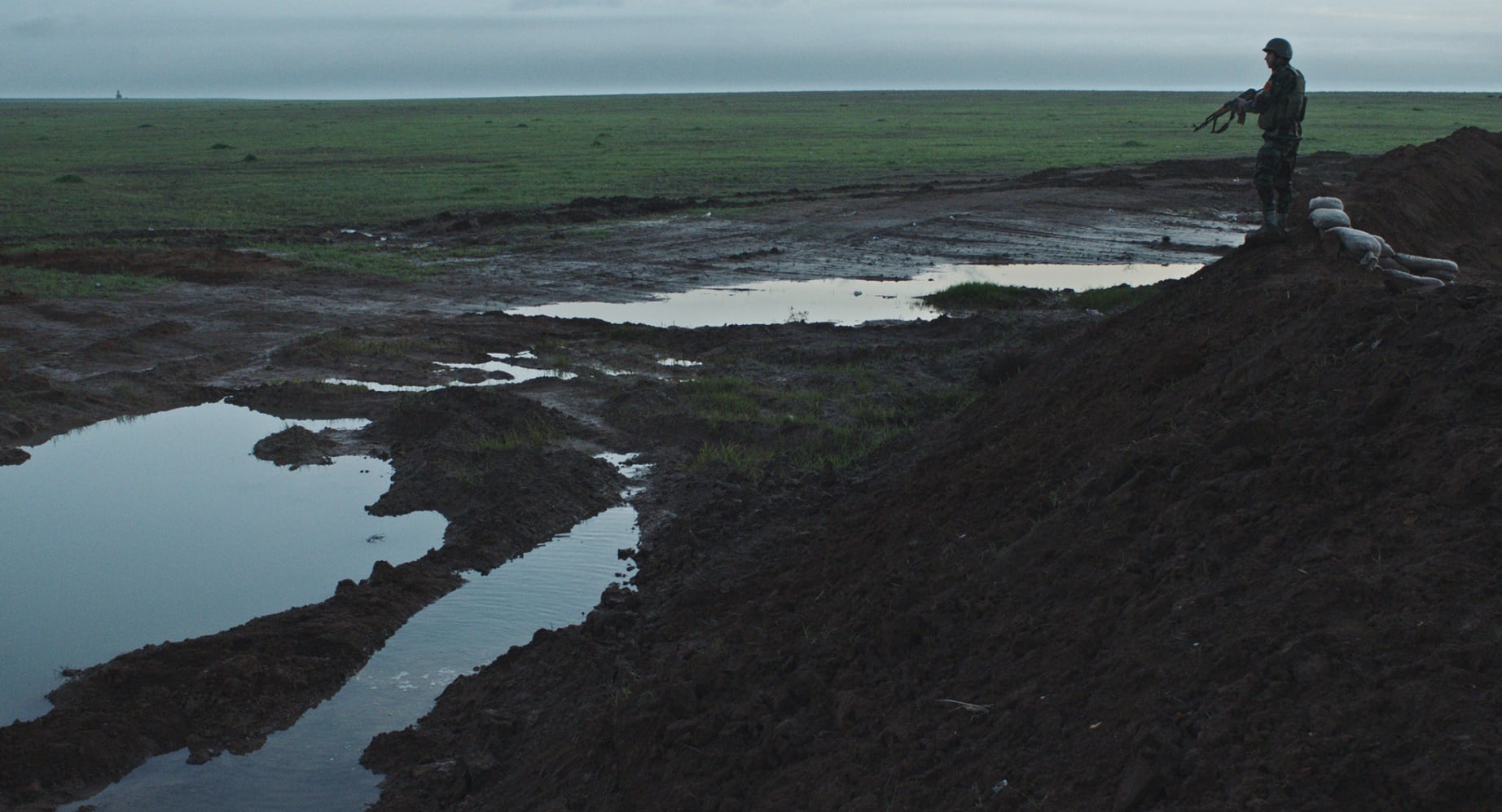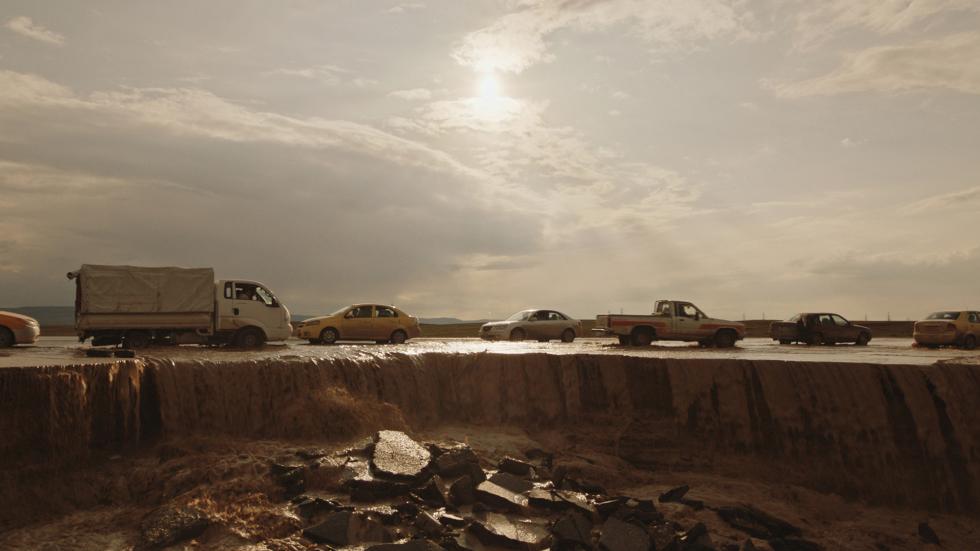The Italian filmmaker shows the daily life of the people living in a Middle Eastern border territory at eternal war. Notturno is an exciting and painful, but also deeply humane journey, with which he participates in the SEFF
A luminous film in the darkness of war, states one of the taglines attached to the poster of Notturno, the new film by the Italian Gianfranco Rosi, non-fiction master and a strong presence in the Official Section of this year's SEFF. Rosi, filmed during three years in this border territory between Kurdistan, Syria and Lebanon. A region marked by violence, invasions and terrorist groups, in a constant exchange of blood and belligerence of which the civilian population is an eternal victim. And, in the midst of death and darkness, life and humanism fight for a foothold.
Gianfranco Rosi (Asmara, Eritrea, 1964) tells us that the film was made because of his interest in exploring the human dimension of military conflicts and their repercussions on the daily lives of those who lived with them. "In my journey I met people living in war zones: Shiites, Alawites, Sunnis, Yazidis, Kurds. They live on both sides of the borders because they were born there or because they were forced into exile, and they are all victims of war, the fruit of ancestral conflicts and the greed of the powerful. I was able to prove that life and a certain "normality" inhabit the fronts of the conflict. It is this vitality that I wanted to capture. Notturno is a political film, but it does not attempt to address the issue of politics. It does not investigate the causes of the conflict or the multiple religious and territorial issues at stake. It simply wants to be as close as possible to the men, women and children whose tenacious survival serves as a metaphor for the absolute that moves me most: the human being.
After collecting awards with his two previous films, Sacro GRA (2013, Golden Lion in Venice and Silver Giraldillo in Seville) and Fuocoammare (2016, Golden Bear at the Berlinale and Best Documentary at the European Film Awards), this expert of the non-fiction continues to showcase his films in the world's most important competitions, with what he defines as "a natural step, crossing the Fuocoammare and landing in Notturno to find where the tragedy comes from".
We dive into the many interviews granted throughout his triumphant career. Rosi gives us some clues to his work, using his own words.
HIS DOCUMENTARY CONCEPT
" I have always worked on the transformation of reality using the language of cinema in a rigorous way, taking advantage of the authority of the documentary. I transform the real, however, into something else: the film must not only be a mere narration of reality; I need it to be a metaphor in the story I tell. The camera is a catalyst for introspection. I believe that my duty as a documentary filmmaker is to find moments of deep intimacy, which for me are a synthesis of life. I am interested in using the language of film to face reality, with awareness and competence, it is this principle that guides my ethical choices".
METHODOLOGY
"Every step is important, but probably the one I enjoy the most is the one where I don't film, because this is the most sincere and real moment. All my films begin with a question, which leads me to a long process of investigation, especially in search of the spaces where I will end up shooting. Maybe I like it so much because, while researching and not filming, I write little notes to help me understand the general dimension of the reality I tell. This is also the stage where I meet people, establish relationships with them, and the joy of having done so accompanies me throughout the film. In this sense, it is often painful to start filming, because as soon as you take the camera out, things change, especially your interactions with people. Yet there is something I love about documentaries: everything you see on the screen is a miracle that you never thought would exist, it was never in my mind. I always say that my films are made on their own, like those plants that are self-reproducing. I just need to take the camera to that moment, which I don't provoke. That happens, most of the time, in a very beautiful way. And that's it.

THE CHARACTERS
"There is no universal and perfect formula for creating a trusting relationship with the people you know and want to follow with the camera. Most of the time, people don't believe that you'll come back, they believe that you'll disappear, and when you do come back, sometimes by simply keeping your promise, the relationship is strengthened. I invest a lot in telling their stories, but they also invest a lot in opening the doors of their intimacy to me. I never tell them what to do, rather I want to know what they do. I have to capture their essence, like a photographer in a single frame; a frame where I also find out what happened before and where it's going. If I don't, it's a bad picture. I get it by deducting and subtracting, like a sculpture by Giacometti, making it thinner and thinner... before it breaks.
THE PRESENCE OF THE CAMERA
"I think the shots have to be as cinematic as possible, as if I were filming professional actors. I never understood the reason for this relationship between a documentary and an unsteady camera looking for a presumed truth. This is not how we do it in life: we stop and look. For me, the truth, the reality, is achieved when I make them forget about the camera. Otherwise I become a constant protagonist. Keeping the camera steady is a way to disappear. Anyway, after a while walking around with the camera, they assume that I am part of the landscape and they forget. There is also nothing staged, or anything important. Many times I don't even ask if I can film, I impose myself, and use my instinct when choosing where to put the camera. Of course, when you do an interview in a documentary you prepare the scene, the place where you are going to have that conversation. When you set up any scene you are already creating a narrative element.
THE ASSEMBLY
"Editing is that phase where you have to deal with a lot of material and you have to write everything down, especially in my case because I don't write anything during the shoot. To do this, it is important to think of everything in the present, forgetting the experience I had during the shooting or the time I spent in those places. And also forgetting that you may have risked your life. When it comes to editing, you have to forget about yourself and listen to the voice of every scene and every moment you filmed. You have to accept that, most of the time, you will miss a lot of things. When you are filming, you inevitably miss something, because you are busy choosing shots and working with the light, or waiting for the right moment, and this makes you miss many of the things around you. It's important to remember that what you didn't film, or what you didn't put in the final edit, is still part of the film. The film is like that because of what I show, but also because of what I missed and the many things I didn't include, and this is a fact that a documentary filmmaker has to accept.
A CONSTANT CHALLENGE
"For me every film is the first and the last. When I start a project, it is important to discover a new language. Therefore, each time it requires a lot of effort and commitment. In fact, I have only shot six feature films and they are all very different from each other. I like documentaries very much because they allow me to experience much more than fiction. I never know what story I'm going to tell. Time is my greatest ally in a film, more than money, more than anything else. I need to buy time, because there is always a beginning, an idea of what I am going to tell, but I never know how it will end. The film is formed as it goes along, thanks to the moments that arise by chance and then become necessities. I don't know what will happen, each film is a journey into the unknown. It is a labyrinth from which I have to find the way out at a certain point. For me it is a way of life. When I start to get bored I won't be able to continue making films.



